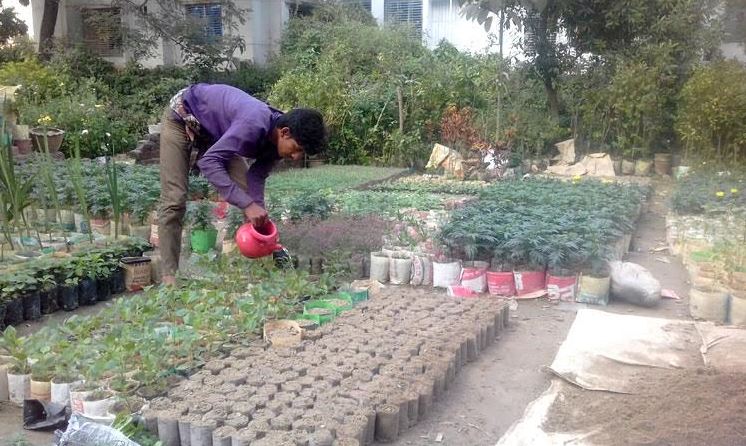
RAJSHAHI, Aug 11, 2024 (BSS) - Currently, nursery owners and workers are seen passing their busy times growing saplings and plants of vegetables, fruits and varieties of flowers during the current season everywhere in the region, including its vast Barind tract.
Conventionally, this time is very vital for the nursery business as demands of seasonal vegetables, fruits and flowers mount to a greater extent.
Many of the micro-entrepreneurs set up makeshift shops at corners and intersections of roads and streets displaying seedlings and plants of vegetables, fruit and flowers on tubs and poly-bags to attract the buyers.
Nursery business has made many owners and micro-entrepreneurs delighted in growing seedlings of vegetables, fruit trees and plants and varieties of flowers as the venture is lucrative compared to other relevant ones.
Belly Begum, 35, has become economically solvent through farming of vegetables on homesteads as its demand has been increasing gradually in society.
A resident of Dighipara village under Paba upazila in the district, Begum is earning cash money through selling varieties of vegetables, including red amaranth, spinach, bottle gourd and Indian spinach (puishak), at present.
Tazrul Islam, owner of Liza Nursery in Postal Academy area, each of the small-size flower seedlings is being sold at Taka 8-10, while the big size is at Taka 25-35 at present.
He said their professional work rises to a greater extent in winter compared to other seasons. Islam said 7-8 people work in his nursery as daily laborers every day.
As a result of the successful promotion of nursery business, homestead gardening has been contributing a lot to strengthening the rural economy by meeting protein demands in the region, inspiring people to cultivate vegetables on the fallow land near their abodes.
Scores of grassroots people are seen cultivating vegetables, spices and fruits on homesteads and other bare lands round the year and changing their fortunes.
Many other youths have made fortunes through commercial flower farming as it becomes a blessing for them in the region, including its vast barind tract.
The enthusiastic youths have found the path of becoming successful entrepreneurs through flower farming with their investments.
Hassan Al Sadi has established a commercial garden on around eight bigha of lands in Polashbari area under Paba upazila with diversified flower plants attracting many flower-loving people to visit every day.
A resident of Chapainawabganj, he got inspiration after seeing a tulip garden at Shripur in Gazipur district and established his 'dreamers garden' in 2020. He also used the open spaces of the mango orchard for flower production by inter-cropping.
Talking to BSS, he said there is an enormous prospect of promoting flower farming in mango orchards as intercropping in the region because huge lands remain fallow more than six to eight months every year.
Zafar Iqbal, 48, a resident of Proshadpara village of the same upazila, has set a bright example in flower farming in the region.
Around three years back, he started flower farming on only ten katha of land and that was the turning point of his life.
More than 1,500 volunteers are encouraging and inspiring farmers to cultivate the less water consuming crops through water resource management on behalf of the recently phase-out 'Integrated Water Resource Management (IWRM)' Project.
DASCOH Foundation has implemented the IWRM project in 1,280 drought-hit villages of 39 Union Parishad and three municipalities in eight upazilas of Rajshahi, Naogaon and Chapainawabganj districts.
Farmers have started showing interest in homestead farming as they reaped a lucrative market price of the crops in the last couple of years, said Jahangir Alam Khan, who was Coordinator of the IWRM Project.
Mahmudul Faruque, Additional Director of Department of Agriculture Extension, said they are ensuring food security through bringing the uncultivated fallen land and homestead under vegetable and fruit cultivation.
A total of 35 demonstration gardens of vegetables, fruits and spices were set up on the unused land in each of the unions under the project.